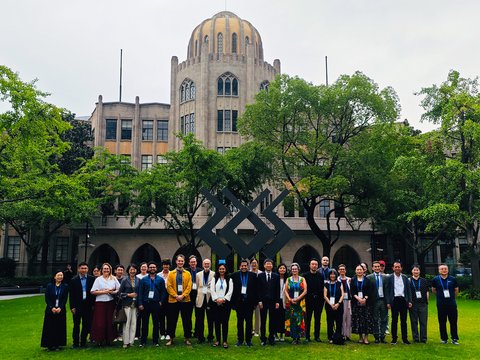UNESCO CHAIR EXPANDS INTERNATIONAL NETWORK
UNESCO Chair expands international network
Shanghai / China, 28.09.23 - In September 2023 the UNESCO Chair on Historic Urban Landscapes and Heritage Impact Assessments at RheinMain University actively participated in the International Conference on Urban Heritage Conservation and Design for Sustainable Development. The conference was hosted and co-organised by Tongji University in Shanghai / China, the College of Architecture and Urban Planning of Tongji University (CAUP), the World Heritage Institute of Training and Research for the Asia and Pacific Region (WHITRAP) and Shanghai Tongji Urban Planning and Design Institute Co., LTD (TJUPDI).
As part of the international conference, new approaches were discussed to use cultural heritage as a starting point for sustainable development under consideration of the UN Sustainable Development Goals (SDGs) and the UNESCO Recommendation on the Historic Urban Landscape (HUL).
The international conference also aimed to establish the International Network for Urban Heritage Conservation in Higher Education Institutions, which will serve as an incubator for Higher Education Institutes all over the world to build up and exchange know-how how to use heritage as a solution to address sustainability and resilience. The UNESCO Chair on Historic Urban Landscapes and Heritage Impact Assessments at RheinMain University will be an active part of this international network by integrating these aims into its research and educational activities.
The objectives and planned activities are:
- contribute to the international debate on the role of culture and heritage in sustainable development processes and address priority areas such as Climate Change, Economic Development and Heritage, acknowledging Traditional Knowledge systems;
- strengthen cooperation between Universities and Higher Education Institutions that have urban heritage conservation and sustainable development as a core line in their teaching, research and action initiatives;
- stimulate and enhance initiatives led by member Universities and Higher Education Institutions to make urban heritage conservation and sustainable development an essential component of academic development, notably through partnerships among other universities and urban conservation-related stakeholders.
- develop academic exchange and innovation and broaden opportunities for teachers, researchers and students in the urban heritage conservation field;
- improve the academic quality of teaching, research and action on urban heritage conservation and sustainable development as well as the academic development of students and researchers;
- facilitate cooperation with non-academic stakeholders such as local communities, local and national governments, and traditional knowledge holders.
